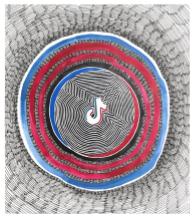Tik Tok: The New Epicenter of Cultural Appropriation
White TikTokers Are Getting the Credit for Dances Their Black Counterparts Created
March 23, 2020
Practically everyone with any kind of social media has seen at least one TikTok. Most likely, it was a person, or a group of people, doing a fast-paced dance to an upbeat song with massive smiles plastered across their faces. The goal of these videos is usually fun, fame—or, most often, both.
Although TikTok is viewed by many as just a fun way to share videos, this relatively new app has received its fair share of backlash, the reasons for which are common among social media platforms: time consumption and waste, giving a platform for people to voice their hateful or hurtful beliefs, and perpetuating the age-old concern of prioritizing technology use over human interaction. However, there is an additional complaint that is specific to TikTok that the company has yet to address: the allowance of content theft and cultural appropriation within their app.
When you hear the word Renegade, you most likely picture the referee-esque hand gestures and dance, and maybe you even break into the routine yourself. But how do you react to the name Jalaiah Harmon? Likely with no reaction at all because you have not heard of her. Harmon is a fourteen-year-old dancer from Georgia who is the choreographer of the Renegade dance. Since she posted a video of the dance on TikTok, it has become an international sensation, with celebrities and people all over the world learning, recording, posting, and receiving praise for the dance. In response to her choreography’s fame and success, Harmon told the New York Times, “I was happy when I saw my dance all over. But I wanted credit for it.” In hopes of receiving some sort of credit and setting the record straight, Harmon commented on a number of influencers’ posts that she created the dance but was mainly met with backlash if she got any response at all.
This lack of attribution is more than just Harmon and others like her not receiving credit; it is theft of ideas—of creators’ time, effort and creativity—and indirect theft of the many opportunities given to those whose artistry is given credit. Take Mason Ramsey, previously known as “that yodeling kid.” His one video brought him fame, fortune, and a massive following. While comparing a singer to a dancer may be comparing apples to oranges, Harmon, who is black, didn’t receive a fraction of the attention, credit, or opportunities that Ramsey, who is white, did. Instead of her and her dance going viral like Ramsey and his music, her dance’s fame exceeded her own, and she was left behind to wonder why.
Harmon is not the only black artist whose work has been usurped by internet crazes. Many of TikTok’s most famous dances were choreographed by black artists whose names were lost upon posting and whose work is being used for the fame of others over their own. This pattern of white people, like the famous TikToker credited with popularizing Renegade, Charli D’amelio, gaining success and fame from appropriating and stealing the work and ideas of black people isn’t new, but TikTok is a new and harmful platform where it can easily take place. TikTok needs to take action to give up and coming artists a platform that supports and celebrates their work rather than steals it.










